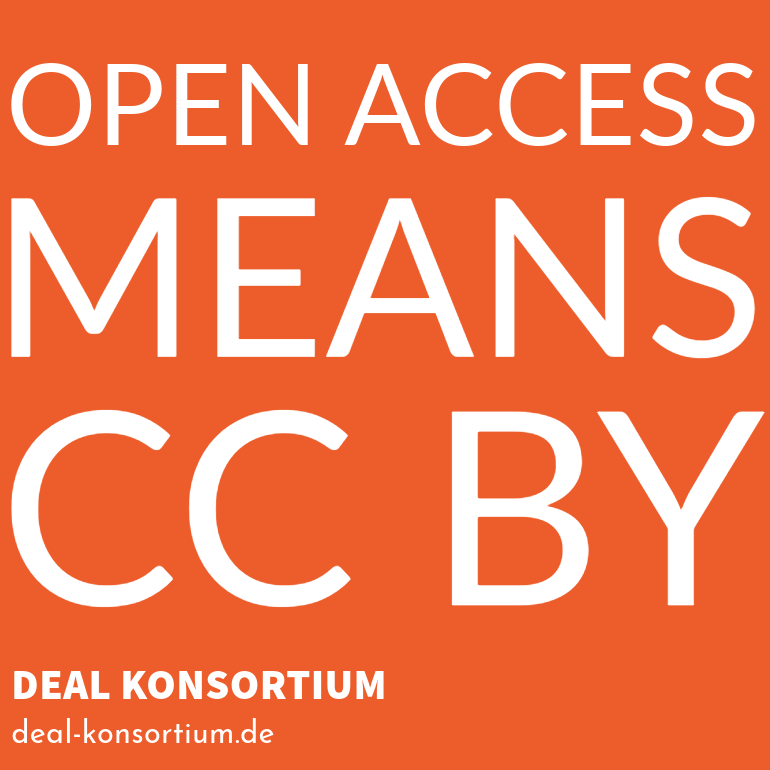|

>> download flyer
|
When publishing your research Open Access, choosing the right Creative Commons (CC) license is crucial. Among the various options, the DEAL-Konsortium recommends the CC BY (Attribution) license, because it stands out as the best choice for maximizing the impact and reach of your work.
Here’s why you as a scientific author should always prioritize CC BY over other licenses when offered, especially those with "non-commercial" clauses.
|
|
The Problem with "Non-Commercial" Licenses
Licenses featuring the "non-commercial" (NC) addition, such as CC BY-NC or CC BY-NC-ND, may seem appealing at first glance. However, they come with significant drawbacks:
-
Exclusive commercial rights to publishers: While choosing a "non-commercial" license type excludes commercial uses, publishers usually require you to assign those reserved commercial rights to them. Unfortunately, many publishers typically claim these rights exclusively, limiting your control over your own work.
-
Commercial exploitation by publishers: Once publishers hold (exclusive) commercial rights, they can commercialize your research, including licensing it to AI companies or other commercial entities (including for commercial use), without your consent and without any revenue sharing.
-
Legal uncertainty: The definition of "non-commercial" is ambiguous under German law. This leads to considerable legal uncertainty as to whether the respective use is permitted. Very often, uses are excluded that the author does not actually want to prevent. For example, it is unclear whether and in which cases NC material can be used in collaborative projects between public and private research institutions. Use by freelance professionals such as doctors, lawyers, architects or even independent research by individuals is clearly not permitted if it serves commercial purposes. In light of these considerations, it becomes evident that NC licenses impede a multitude of desirable uses, thereby contradicting the fundamental tenet of open access.
-
Not compatible with the Open Access definitions: NC licensed material is not “Open Access” per definition. The “Berlin Declaration on Open Access to Knowledge in the Sciences and Humanities” requires Open Access works to be licensed “for any responsible purpose”. Commercial use of research is, obviously, a reasonable purpose in this regard.
>> Non-commercial license types exclude many wanted use cases of your research without considerable advantages. They are no real open licenses.
The Advantages of CC BY
The CC BY license offers numerous benefits that make it the preferred choice for open access publishing:
-
Maximized reuse and dissemination: CC BY allows others to distribute, remix, adapt, and build upon your work, even commercially, as long as they credit you. This maximizes the reach and impact of your research.
-
Equal commercial use for all: Yes, CC BY does allow for commercial use, but it does so equally for everyone. And given that non-commercial is often interpreted extremely narrow, to the extent that posting a NC-licensed article on a website with advertising can be considered a breach of the NC license terms, it is important to allow it. While this might initially seem daunting, it actually serves as the best protection against exploitation by individual players. When everyone has the same rights to use your work commercially, it prevents any single entity from monopolizing or unfairly profiting from it—addressing current concerns, such as those related to AI.
-
Alignment with key Open Access statements: CC BY is aligned with major Open Access declarations, such as the Berlin Declaration on Open Access. It is also the preferred license of many research funders and organizations worldwide.
-
Legal clarity: CC BY provides clear and straightforward terms, reducing legal uncertainties and ensuring your work can be freely used and shared across various platforms and by diverse audiences.
>> The CC BY license provides a clear and easy understandable framework for all third parties. It allows for equitable and open use for everyone consistent with the basic principles of Open Access.
Make the smart choice for your research. Choose CC BY.
To ensure your research achieves the greatest possible impact and benefit for everyone everywhere on earth, always choose the CC BY license when publishing open access. This choice not only aligns with global Open Access standards but also protects your work from unintended exclusive commercial exploitation and legal ambiguities.
Disclaimer: This information has been prepared with in cooperation with Dr. Till Kreutzer, iRights.Law. However, it is intended for informational purposes only and does not constitute legal advice. Researchers are free to choose any type of license they deem appropriate for their work.
More information on Open Access licenses is available at
|


